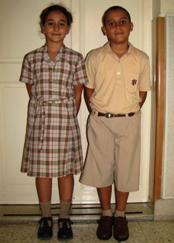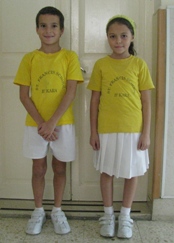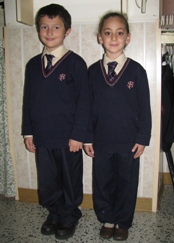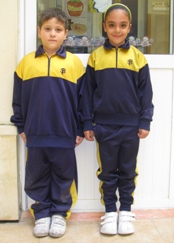|
School Policies Download your printable copy of the school policies here. Our school policies are carefully developed by and agreed upon by all stakeholders including, administration, staff, parents and students. Our policies establish clear and defensible principles, set the boundaries of acceptable behaviour, provide guidelines for action, and are firmly and consistently applied. Such policies are made explicit to all members of the school community as well as to the parents. Our policies are in accord with the National Policy and are based on RESPONSIBILITY and RESPECT. Discipline Discipline is an important factor in a child's education, as it helps a child develop in a desirable way for our society. Therefore we encourage parents to be partners with the school so that we can work hand in hand for the benefit of the children. Parents/guardians are important stakeholders in their children's education. The right kind of behaviour is expected not only at school but also while travelling on a school bus and during organised excursions. The school primarily believes in positive re-enforcement - encouraging the children to be responsible for their actions and their work. We do this by explaining to them the reason behind this way of thinking and showing them that we believe in them and their capabilities. The students are praised and rewarded whenever they make an effort and we aim to establish a good relationship with them because we believe that this will enhance their behaviour. But when school rules are broken, especially repeatedly, disciplinary action needs to be taken. When doing so, we follow the principles as laid down in the publication "Good Behaviour and Discipline Policy for Schools" published by the Ministry of Education in February 2002. There are various types of unacceptable behaviour, which include disruption of lessons, shouting, disrespect for staff members and other students, failure to do one's class-work and homework, bad language, fighting, bullying, vandalism, pilfering and any other forms of disrespect towards other people and their property. The disciplinary action to be taken is decided by the school administration together with the class teacher and its severity depends on the severity of the case. When a parent/guardian does not agree or does not understand the action taken, he/she should contact the school administration in order to clarify matters. However, it is also important that they speak about school with respect, because otherwise their children will not learn to show respect. A school will only function effectively if it is orderly and its atmosphere is relaxed. The school management must try at all times to maintain good relationships with the rest of the staff, parents, students and all stake holders. At classroom level, it is imperative that teachers are always well prepared for each and every lesson. We believe that it is by setting a good example with clear aims and high expectations, together with providing help and support, that we can expect students to progress. Attendance School attendance is important for the development of our children. Furthermore regular attendance is compulsory. All absences of students require notification and justification. Parents must call or write a note for their children to be released before the official time. If a student is absent persistently, even if with a medical certificate, the Education Division will have to be notified. If a student is going abroad during school days, a letter signed by both parents has to be produced for the school to evaluate. In any case, the absence should not exceed 3 weeks, and holidays during school days are not to be encouraged. In the case students missing out on school, neither the school, nor the teacher will be held responsible for any drop in the student's grades. If a student needs to be picked up early from school, or if the student needs to be absent from school due to a medical appointment, the school should be notified with a letter explaining the circumstances. Should an accident occur in school, the teachers will notify the Head, and the student will be administered with First Aid, should it be the case. If a student needs to be taken home, or to hospital, due to illness or accident, the parents will be notified and the necessary arrangements will be seen to. School starts at 7:40am with an assembly. In winter school ends at 1:15pm, while in summer school ends at 11:30am. Responsibilities RESPONSIBILITIES are shared between teachers, students and parents. It is through partnership in responsibilities that effective progress is made in the school community. THE SENIOR MANAGEMENT TEAM (SMT) is responsible for ensuring that a fair and effective Code of Behaviour and Discipline is developed and implemented with the participation of staff, students and parents. It is the responsibility of the Head of School and the Assistant Heads to create the right climate within which individuals in the school community can fulfil their responsibilities and to ensure that the School's Code is administered in a manner which is consistent and fair to all. THE SCHOOL PERSONNEL plays a crucial role in fostering an environment that nurtures and supports good behaviour and mutual respect among all the members of the school community - the school management team, teachers, support staff, students, parents, students' council and other persons and professionals who provide a service to the school. It is the staff's responsibility to respond promptly and firmly to any instances of unacceptable behaviour. While being firm and consistent, any response to disruptive behaviour is never directed to the person but to the action. Sarcastic remarks which invariably hurt, antagonise, and win the sympathy of disgruntled fellow students are avoided. Refer to the Teachers' Code of Ethics for more information. PARENTS/GUARDIANS and a supportive home environment play a crucial role in shaping attitudes that produce good behaviour in schools. It is therefore important that parents are aware of the aims, values and the nature of expected behaviour of the school. Parents are also encouraged to become involved in the process of the drawing up of the School Code. For the smooth running of the school and for good behaviour and effective discipline to be properly exercised, the school encourages parents to be partners. Parents are supported by the school and feel that they are important stakeholders in their children's education. For this purpose, home-school links are established through a variety of means such as frequent activities that involve parents in educational matters. On their part, parents need to regard the establishment of home-school collaboration as a parental responsibility. Parents who sincerely wish to practice positive discipline with their own children must endeavour to become a positive role model in their children's life. Such role modelling extends to their behaviour on or near the school premises. For this reason the school expects parents to:
STUDENTS in our school are encouraged to learn about and apply life enhancing skills as self-control, conflict management, problem-solving, decision-making, and effective intra-/inter-personal communication. Students learn to appreciate that negative behaviour has its consequences and that good behaviour shapes the desired community environment. The school expects the following from the students:
General Rules RULES are established for all stakeholders to follow and are a means of showing respect towards the school community in general. The following policies should serve as guidelines for parents, teachers and students to ensure the smooth running of the school for the common good. PUNCTUALITY is highly valued and keeping the time schedule is a form of respect to the whole community.
ATTENDANCE guarantees consistency in the learning process. Parents and guardians have legal responsibility to ensure regular school attendance.
THE SCHOOL UNIFORM is part of our school identity and every student should strive to be smart. Unless otherwise instructed, the PE Kit should only be worn on days when the students have their P.E lesson. A navy blue windcheater should be always in the child's school bag. Students are not to bring umbrellas to school. Should students fail to wear the appropriate school attire a note will be sent home to be signed by parents. If this offence is repeated a second time the parents will be contacted by the SMT. In the event of a third offence the child will not be allowed in the class until the parents come to school to change his/her uniform. The following information should guide you when sewing or buying both winter and summer uniforms.
GENERAL APPEARANCE is of utmost importance. Students, teachers and parents are expected to maintain high standards in their personal appearance. This is part of being proud of themselves and of their School.
PERSONAL PROPERTY should be taken care of by the student. It is the student's responsibility to take care of his/her personal belongings.
SCHOOL PROPERTY should be taken care of by all stakeholders. The school staff, students and parents are expected to respect school property such as furniture, buildings, books, materials and equipment. Students have an important role to play in ensuring that the physical environment is kept clean and attractive. Toilets are to be kept clean at all times. Students are responsible for school books and other educational materials and equipment in their possession and are not to deface or damage them. Fines will be charged for any damage or loss. In case of intentional damage to school or personal property of others, such behaviour renders parents or guardians liable for restitution. Fines equivalent to the minimum cost of the item damaged or destroyed will be charged. Incidents of pilfering will be dealt with in a similar manner. HEALTH AND SAFETY are promoted at our school through daily, good healthy habits and through curriculum practice as we recognise that health is an imperative objective and the well-being of every stakeholder in our community is at heart.
CHILD PROTECTION is another main responsibility of the school. Abuse of minors disrupts the growth and development of children and their capacity to grow, learn and to be happy. It affects children negatively and can harm them for life. All school staff, both teaching and non-teaching, are instructed to report any suspicions to the Head of School. The SMT will then refer to the policy on child protection of the Ministry of Education that outlines the procedures to be followed in cases of suspected child abuse. When the school refers a concern to the Child Protection Unit, it is not accusing the parents of abuse but requesting that further investigation takes place to establish whether a child is at risk. SUBSTANCE ABUSE harms students, threatens the safety of the environment and disrupts the educational process. It is the duty and obligation of school staff to take all necessary measures to prevent, curb and eradicate substance abuse in schools. When a student on the school premises is found in possession of an illegal substance or substance-related paraphernalia, the SMT informs immediately the Police Drugs Squad and the student is kept under strict supervision. Parents will be notified about the incident and asked to come to school immediately. Disciplinary measures will be taken by the school in line with the Education Act, Substance Abuse Policy. BULLYING including all forms of verbal and physical behaviour that is meant to hurt, intimidate or jeopardise the integrity and the dignity of a person is strictly forbidden. Name calling, ridiculing, taunting, threatening and use of physical violence are all forms of bullying. The SMT will take the necessary measures in line with the Anti-bullying Policy Document of the Division of Education to prevent and stop such acts. PORNOGRAPHY/INDECENT BEHAVIOUR AND CORRUPTION OF MINORS are strictly forbidden and action will be taken immediately. Sanctions are even more severe when the pornographic materials found have been distributed or sold to other members of the school community. The SMT will refer to part of the Child Protection Procedures for schools that specifically deals with Sexual Abuse. Services SERVICES OFFERED BY THE SCHOOL are all aimed to improve the quality of life of the school community in general. Such services are offered through the Secretariat for Catholic Education or directly through the Ministry of Education. If a student requires any of the following services, parents will be notified and they will be asked to give their consent so that their child will be able to receive the necessary support. Our school benefits the service of an inclusive education coordinator who coordinates all the special educational needs of our children together with a number of LSEs, a complementary teacher and other supporting staff. The complementary teacher in our school screens all students in their early years classes and supports any children who need extra help in Literacy. The complementary teacher and the school are supported by the Literacy teachers from the Secretariat for Catholic Education, who visit the school on a regular basis. A good number of LSEs (Learning Support Educators) work hand in hand with the class teachers and the students while offer their support for general and particular student needs according to the cases assigned to them. The school also offers the service of a school councillor, who contacts the parents themselves when problems occur, and who can be contacted by any parents who feel the need. The school also benefits the service of a nurse from the Health Centre, who follow the students' medical growth from time to time. Behaviour Policy THE SCHOOL'S BEHAVIOUR POLICY and its implementation will not by itself solve all behavioural problems at school. It is only one of several initiatives that our school undertakes as part of a systematic approach that embraces a broad understanding of the needs of the whole school community. A system of positive reinforcement is the main feature of our School Code of Behaviour and Discipline. Students are encouraged to act responsibly towards all members of the whole school community. Teachers record and celebrate such behaviour to ensure that achievement in this regard is clearly recognised and differentiated from academic performance. The main aims of such an approach are to create and nurture a climate in which all students, irrespective of their academic abilities, act positively, and to create an ethos where positive and considerate behaviour becomes the norm. Reinforcement of good behaviour takes place when it is recognised, acknowledged and supported. Such a system is not just a matter of issuing merits. It is a question of sensible use of language in one's everyday interactions with students and of communicating the value one attaches to good behaviour. In the first few weeks of every scholastic year, the SMT and teachers make the students aware of what is expected of them and how behaviour can be rewarded or sanctioned on a class and school level. The following is a list of examples of positive reinforcements that are regularly used in our school:
BEHAVIOUR includes the student's respect for oneself, respect for others, respect for the school and local community, and respect for the environment. Given that students have a right to be in an orderly and safe learning environment, they are expected to behave, both inside the school premises as well as on school buses, in a friendly and orderly manner and to show respect for all persons and property. Good conduct reflects the attempt by the whole school community to present a positive image of itself as a caring, learning community. UNACCEPTABLE BEHAVIOUR is dealt with in a fair and consistent way. Any response to disruptive behaviour is never directed to the person but to the action. Unacceptable behaviour includes repeatedly disrupting the class, shouting, leaving the class without authorisation, showing disrespect for teachers and other students, lingering, failure to do work to the best of one's ability, fighting, using inappropriate language, playing rough, behaving disrespectfully with others, throwing objects at others, bullying someone and indulging in acts of vandalism. The following disciplinary measures will be taken by the school in circumstances of unacceptable behaviour. THE APPLICATION OF SANCTIONS is in itself a learning opportunity that reinforces good behaviour. The following are 3 levels of sanctions which are taken by the school in incidents of unacceptable behaviour. Level 1 sanctions are intended for minor offences that are one-off or infrequent. The school will never lose sight of the importance of low level sanctions such as reminders of school rules and of classroom standards and expectations. A quiet word, aside from other students, a verbal rebuke, or a reprimand for failing to meet standards are all valid low level sanctions. In other cases, teachers may choose to keep students back at the end of the lesson, break or to do some additional work. Level 2 sanctions are intended for more serious offences imposed on level 1 persistent offenders. These sanctions deal with more serious types of incidents or an accumulation of incidents of misbehaviour. In such circumstances the pupil may need to be moved within the classroom, or taken off task. At this level of sanction application, the Assistant Head will be involved, especially if no improvement has been observed after applying low-level sanctions. Other disciplinary measures may include extra work assigned to students, time-out in which the student is removed from class for a supervised, cooling-off period while being provided with a meaningful task; a written report by the teacher submitted to the Assistant Head; a written note to parents on the child's school diary followed by a signed note from the parents and an after-school detention during which the child will be asked to execute a meaningful task. In this case the SMT informs the parents in advance and the parents are responsible for transport. Level 3 sanctions are intended for very serious offences. Sanctions at this level may include sending students to the Assistant Head or the Head of School; suspension from the rest of the day's lessons; temporary change of class; suspension for a few days (this sanction is authorised and applied by the Head of School after the student's parent or guardian has been informed); expulsion (this sanction is also authorised and applied by the Head of school. It will be only given in the most extreme cases of indiscipline and after every effort at rehabilitation by the School's Pastoral Care Team has failed and every other sanction exhausted). Corporal punishment is strictly forbidden. BEHAVIOUR ON SCHOOL VANS should also reflect one's responsibility towards others. While travelling on a school van, students must behave in an orderly and respectful manner. The van driver is responsible for the students on board and their behaviour. School discipline policies apply to bus boarding and travel as well. ORGANISED EDUCATIONAL EXCURSIONS, field trips and seminars are authorised and may be taken as an extension of the classroom to contribute to the achievement of the educational goals of the school. Students are expected to attend these activities. While on such excursions, students are to consider themselves as guests and ambassadors of their school. Students must treat teachers, helpers and guides with respect and courtesy. Parents will be notified with details regarding the educational excursion and asked to give their consent in writing. Students cannot attend an educational excursion without their parents' consent. Unacceptable Behaviour & Consequence
|
|||||||||||||||||||||||||||||||||||||||||||||||||||||||||||||




